|
Books
|
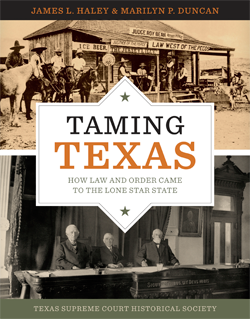
|
Taming Texas: How Law and Order Came to the Lone Star State
|
by James L. Haley and Marilyn P. Duncan
This book, published through the Society’s Taming Texas Judicial Civics and Court History Project, shows how the state’s court system fits into the larger picture of Texas history: its roots, heroes, growing pains, and milestones, from the days of early Spanish colonization to the present.
Written specifically for seventh-grade Texas history classes, the book’s opening stories help students place themselves in an early Texas in which there was no law or order, and challenge them to think about how a society begins to organize itself. Subsequent stories show how laws were made and tested in the courts over the next 150 years, with an emphasis on the aspects of the Texas experience that are uniquely our own.
Taming Texas is beautifully illustrated with historical maps, photos, and drawings that bring its stories to life. It offers readers of all ages a new and intriguing perspective on Texas history.
Hardback copies of the book are available for $20 plus $5 to cover postage, handling, and sales tax. Electronic copies can be downloaded free below.
|
Order Here
|
|
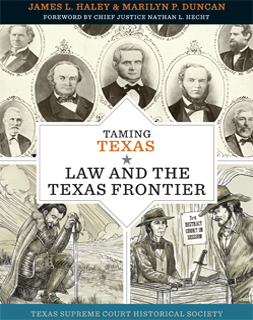 |
Taming Texas: Law and the Texas Frontier The second book in the Taming Texas Series takes a closer look at how life on the frontier of Texas both shaped and was shaped by changing laws. Beginning with the claiming of El Paso by Spanish conquistador Don Juan Oñate in 1598 and ending with the closing of the Texas frontier in 1900, the book shows how the characters and events of Texas history were connected in important ways to the legal systems in place at each juncture. It also reveals what happened when the laws were not up to the task of protecting people, especially during the Civil War and Reconstruction.
Like the first book, Law and the Texas Frontier was coauthored by James L. Haley and Marilyn P. Duncan. About the authors.
The Taming Texas books are generously funded by the Fellows of the Texas Supreme Court Historical Society. Click here for a list of the TSCHS Fellows.
Book downloads:Taming Texas: Law and the Texas Frontier
Order Here
|
|
|
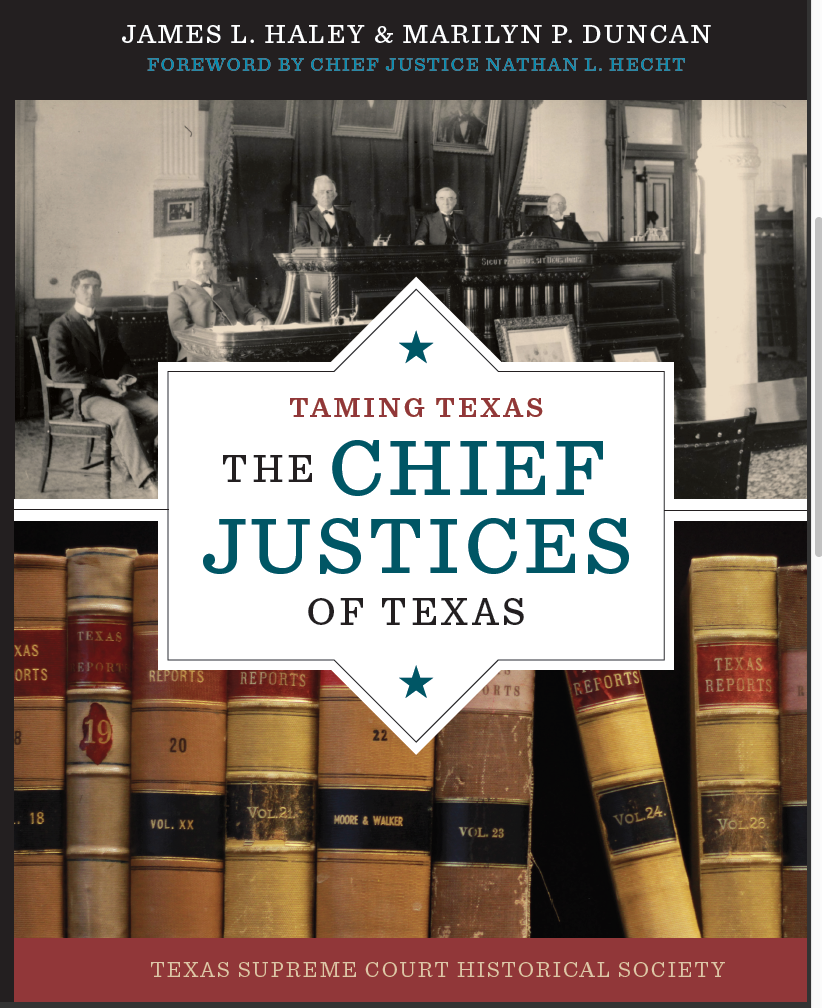
|
Taming Texas: The Chief Justices of Texas
|
by James L. Haley and Marilyn P. Duncan
This third book in the Taming Texas Series tells the stories of the twenty-seven men and one woman who have served as Chief Justice of the Texas Supreme Court so far. The other two books in the series showed how Texas changed from an uncivilized frontier to the thriving state it is today with the help of a strong legal system. This book takes a closer look at those individuals who rose to the top of the system. Some held the Chief Justice position for many years, while others were short-timers. Their names are not as well known as other leaders throughout Texas history, but this book is a first step toward changing that.
The Taming Texas books are generously funded by the Fellows of the Texas Supreme Court Historical Society. Click here for a list of the TSCHS Fellows.
Hardback copies of the book are available for $20 plus $5 to cover postage, handling, and sales tax. A PDF version may be downloaded free below.
|
Order Here
|
|
|
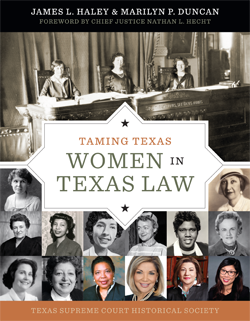
|
Taming Texas: Women in Texas Law
|
|
by James L. Haley and Marilyn P. Duncan
The fourth book in the Taming Texas Series focuses on the role that women have played in shaping Texas law from the frontier days to modern times. Empowered by the liberal property rights of Spanish civil law but hampered by the restrictions imposed by English common law, early Texas women faced unique challenges. It took many decades and many determined women to change the laws and attitudes that kept them from becoming lawyers, voting, running for and winning public office, serving as judges, serving on juries, owning their own businesses, and in other ways having equal legal rights with men. Their stories vary from the boldly courageous to the quietly inspirational.
Like the other volumes in the series, Women in Texas Law was written for the Texas Supreme Court Historical Society’s Taming Texas Judicial Civics and Court History Project for seventh-grade students. Funded by the Society’s Fellows, the book is beautifully illustrated with historical photos and original drawings that make the stories come alive.
Hardback copies of the book are available for $20 plus $5 to cover postage, handling, and sales tax. E-book versions can be downloaded free.
|
Order Here
|
|
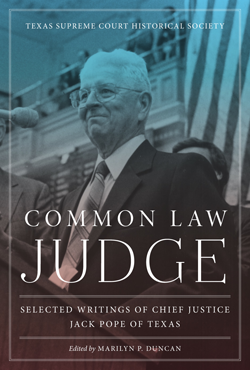 |
Common Law Judge:
Selected Writings of Chief Justice Jack Pope of Texas
Edited by Marilyn P. Duncan
Chief Justice Jack Pope is widely acknowledged in the legal community as one of the Texas judiciary’s brightest stars. During his 38 years on the bench he not only authored more than one thousand opinions, many of them landmark cases, but he also led the charge to bring about fundamental reforms in the judicial system.
CJ Pope’s articles, lectures, and essays on the common law and the art and science of judicial decision-making—many of them unpublished until now—are gems of legal writing. This book, which includes the best of those writings as well as excerpts from 10 of his landmark Civil Appeals Court and Supreme Court opinions, is a must-read for Texas attorneys and judges as well as others interested in the evolution of Texas law.
The book is available to Society members at a special discounted price of $20, including sales tax. The price for non-members is $29.95.
Order Here
|
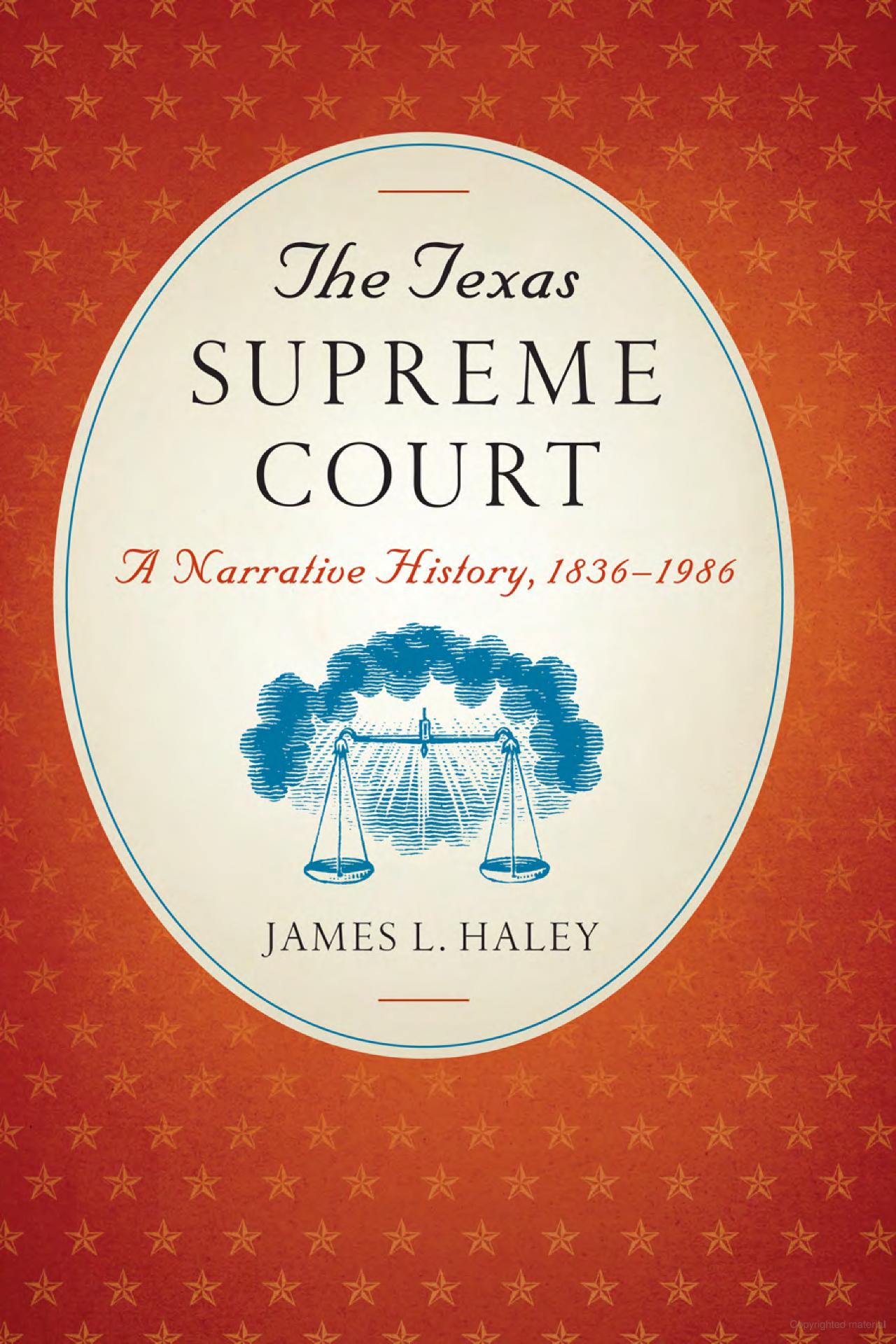 |
The Texas Supreme Court:
A Narrative History, 1836-1986
by James L. Haley
In the first book-length history of the Texas Supreme Court in almost 100 years, award-winning author James L. Haley tells the story of the Court from its Republic frontier through the volatile decades of the 20th century. The book, published by the University of Texas Press in 2013, is the premier volume in the Society-sponsored Texas Legal Studies Series.
 Order Here
Order Here |
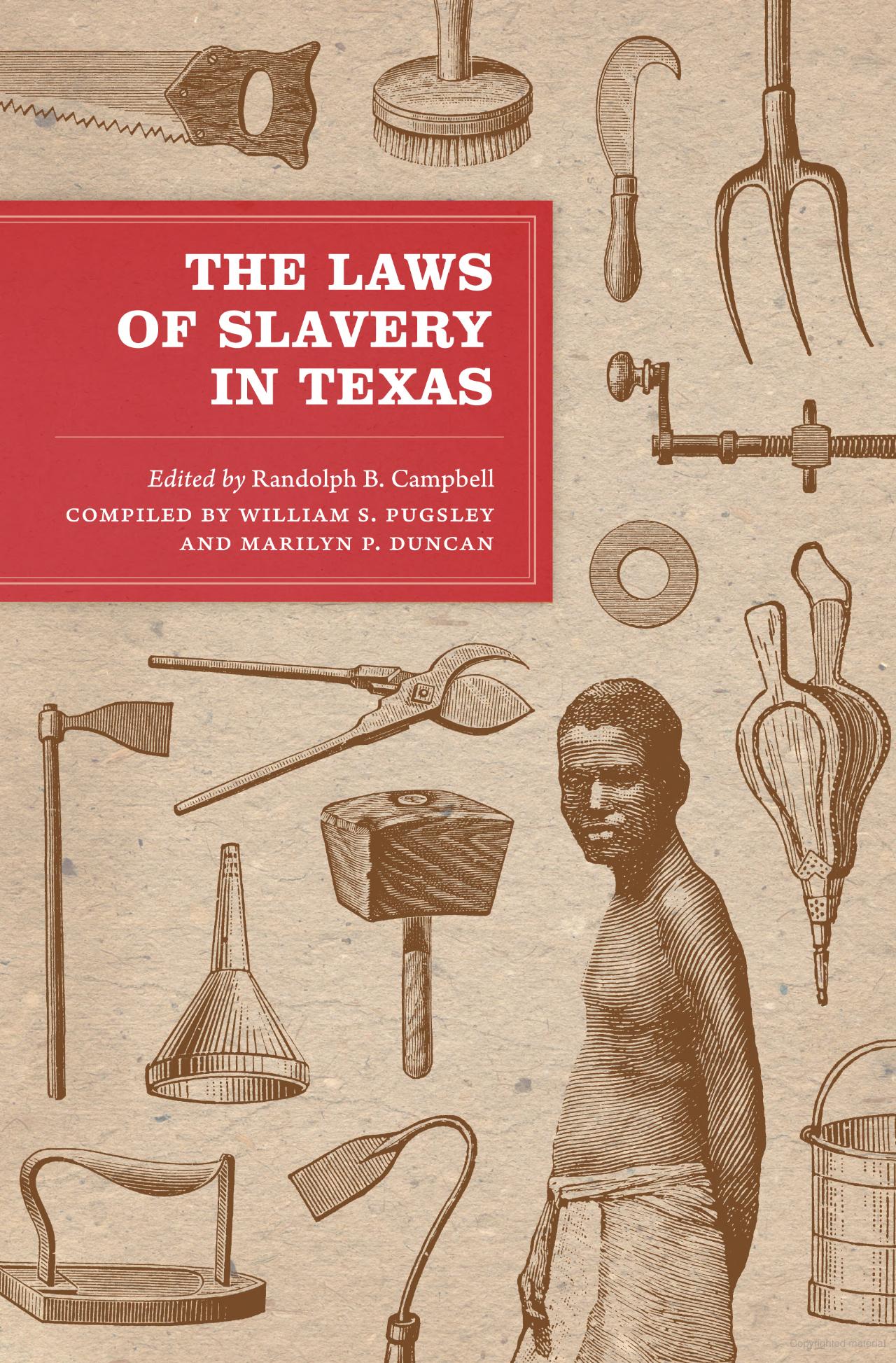 |
The Laws of Slavery in Texas
Historical Documents and Essays
Edited by Randolph B. Campbell
Compiled by William S. Pugsley and Marilyn P. Duncan
The laws that governed the institution of slavery in early Texas were enacted over a fifty-year period in which Texas moved through incarnations as a Spanish colony, a Mexican state, an independent republic, a part of the United States, and a Confederate state. This unusual legal heritage sets Texas apart from the other slave-holding states and provides a unique opportunity to examine how slave laws were enacted and upheld as political and legal structures changed. The Laws of Slavery in Texas makes that examination possible by combining seminal historical essays with excerpts from key legal documents from the slave period and tying them together with interpretive commentary by the foremost scholar on the subject, Randolph B. Campbell.
Campbell's commentary focuses on an aspect of slave law that was particularly evident in the evolving legal system of early Texas: the dilemma that arose when human beings were treated as property. As Campbell points out, defining slaves as moveable property, or chattel, presented a serious difficulty to those who wrote and interpreted the law because, unlike any other form of property, slaves were sentient beings. They were held responsible for their crimes, and in numerous other ways statute and case law dealing with slavery recognized the humanness of the enslaved. Attempts to protect the property rights of slave owners led to increasingly restrictive laws—including laws concerning free blacks—that were difficult to uphold. The documents in this collection reveal both the roots of the dilemma and its inevitable outcome.
Order Here
|
|
|
|
|
|